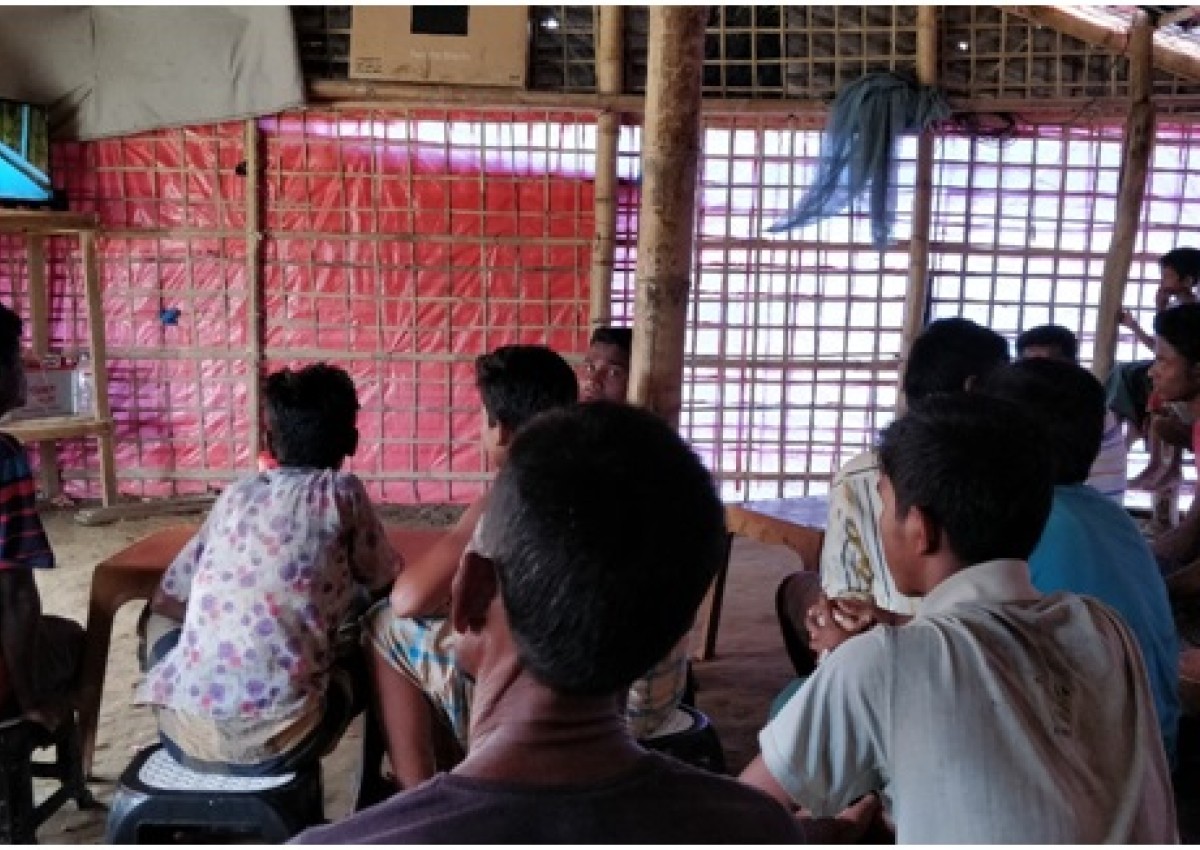





"By Nusrat Daud Pritha"
It was very hot all day. Butthanks to the little rain, the weather became fairly pleasant around late noon. Most of the aid workers were wrapping up their work and the men were gathering around in the local tea and paan(betel leaf) stalls to spend the rest of their afternoon chatting.
 In the refugee camps, it is not uncommon to see a group of men gathered in a shop, sitting, chit-chatting, sipping tea and watching TV powered by solar power. Back in Myanmar, they were working as farmers, some had small businesses while others worked in the forest to forage for wood and fire. . Life in the refugee camps has been slow for them. Some men, who are educated, are fortunate enough to find work with different NGOs as local volunteers, others find day to day work as labor, also initiated by the aid agencies. But a majority of men have no work. They spend lazy days doing nothing.
In the refugee camps, it is not uncommon to see a group of men gathered in a shop, sitting, chit-chatting, sipping tea and watching TV powered by solar power. Back in Myanmar, they were working as farmers, some had small businesses while others worked in the forest to forage for wood and fire. . Life in the refugee camps has been slow for them. Some men, who are educated, are fortunate enough to find work with different NGOs as local volunteers, others find day to day work as labor, also initiated by the aid agencies. But a majority of men have no work. They spend lazy days doing nothing.
A group of about 11-12 men gathered in one of the tea shops in Block B, camp 16, Potibunia. This shop is run by the host community members and has become a common meeting place for men from Blocks B and C. Much of their conversations are about their present living conditions and what will happen next. Md. Foyaz works as an aid agency volunteer in Camp 16 and Md. Anas has set-up a small shop of paan[1], and other knick-knacks. Their children attend basic learning centers now, but as parents they worry about their higher studies. “Life was not bad in Burma [Myanmar], but there was immense pressure from the government. We were constantly worried about our safety; we did not have freedom of movement.” said Md. Foyaz.
While most men are thankful to the aid agencies and the Bangladesh government for all their support, but now that it is becoming a year, they are starting to ask for further improvementsin their living conditions. “Now we constantly worry about landslides and hillerosions. Many latrines are also failing. We worry about the safety of our women as they have to don burka and go far to use the facilities.” added Md. Foyaz.
 Rahman, one of the more aged from the group demanded better cooking facilities, “Firewood is scare here. We are unable to source them and have to buy. But we don’t have money to buy. If we are provided gas stoves, then we do not have to worry about cooking. Yes, food tastes better when cooked with wood, but here we can neither arrange wood, nor have the space to stock them. So we will be content with gas stove.”
Rahman, one of the more aged from the group demanded better cooking facilities, “Firewood is scare here. We are unable to source them and have to buy. But we don’t have money to buy. If we are provided gas stoves, then we do not have to worry about cooking. Yes, food tastes better when cooked with wood, but here we can neither arrange wood, nor have the space to stock them. So we will be content with gas stove.”
“We are happy here. Life is secure. The locals are very supportive towards us. But our living conditions are difficult. Right now we need improved and bigger shelter, solar lights in our shelters and gas stoves so that we can cook and eat home cooked meals without much difficulty.”said Md. Anas
The attendant at the tea stall is a woman. This sight is highly unusual to these men given their societal norms. They were rather uncomfortable to approach her for tea or anything. But as time passed they have gotten used to seeing women working outside, having jobs. “Now we do not feel shy. She is like our sister”, said Md. Ayub, flashing his paan stained teeth. But would they allow their women to come out of enclosure and hold jobs like the Bangladeshi women, the answer was an unanimous ‘no’ nod among all the men. “If our women are working, it will be disrespectful towards our religion.” said the elderly Abdur Rahman. [1] Betel leaf and nut
© Copyright 2026 CARE Bangladesh. Powered By Bangladesh Online